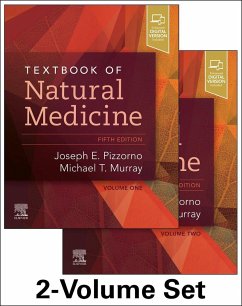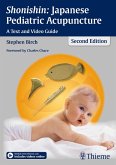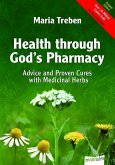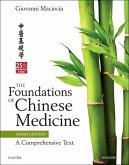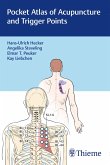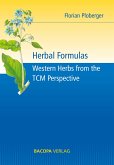- Gebundenes Buch
- Merkliste
- Auf die Merkliste
- Bewerten Bewerten
- Teilen
- Produkt teilen
- Produkterinnerung
- Produkterinnerung
Provide effective treatment with evidence-based natural medicine! Textbook of Natural Medicine, 5th Edition shows how to use natural medicine, Western medicine, or a blend of both to develop scientific treatment plans. Based on a combination of philosophy and clinical studies, this text explains how to diagnose the underlying causes of disease and provide therapeutic interventions that support the body's own healing processes. Written by noted educators Joseph Pizzorno and Michael Murray, this text summarizes the pharmacology of herbal supplements, and emphasizes preventive, non-invasive, and natural treatments.…mehr
Andere Kunden interessierten sich auch für
![Shonishin: Japanese Pediatric Acupuncture Shonishin: Japanese Pediatric Acupuncture]() Stephen BirchShonishin: Japanese Pediatric Acupuncture86,99 €
Stephen BirchShonishin: Japanese Pediatric Acupuncture86,99 €![Health through God's Pharmacy Health through God's Pharmacy]() Maria TrebenHealth through God's Pharmacy18,00 €
Maria TrebenHealth through God's Pharmacy18,00 €![The Foundations of Chinese Medicine The Foundations of Chinese Medicine]() Giovanni C. MaciociaThe Foundations of Chinese Medicine131,99 €
Giovanni C. MaciociaThe Foundations of Chinese Medicine131,99 €![Pocket Atlas of Acupuncture and Trigger Points Pocket Atlas of Acupuncture and Trigger Points]() Pocket Atlas of Acupuncture and Trigger Points54,99 €
Pocket Atlas of Acupuncture and Trigger Points54,99 €![Herbal Formulas. Herbal Formulas.]() Florian PlobergerHerbal Formulas.79,00 €
Florian PlobergerHerbal Formulas.79,00 €![Spagyrik Meridiane Emotionen Spagyrik Meridiane Emotionen]() Roland LacknerSpagyrik Meridiane Emotionen39,95 €
Roland LacknerSpagyrik Meridiane Emotionen39,95 €![Emei Methode Emei Methode]() Emei Methode44,95 €
Emei Methode44,95 €-
-
-
Provide effective treatment with evidence-based natural medicine! Textbook of Natural Medicine, 5th Edition shows how to use natural medicine, Western medicine, or a blend of both to develop scientific treatment plans. Based on a combination of philosophy and clinical studies, this text explains how to diagnose the underlying causes of disease and provide therapeutic interventions that support the body's own healing processes. Written by noted educators Joseph Pizzorno and Michael Murray, this text summarizes the pharmacology of herbal supplements, and emphasizes preventive, non-invasive, and natural treatments.
Hinweis: Dieser Artikel kann nur an eine deutsche Lieferadresse ausgeliefert werden.
Hinweis: Dieser Artikel kann nur an eine deutsche Lieferadresse ausgeliefert werden.
Produktdetails
- Produktdetails
- Verlag: Elsevier LTD
- 5th Edition
- Seitenzahl: 2000
- Erscheinungstermin: 25. August 2020
- Englisch
- Abmessung: 297mm x 225mm x 124mm
- Gewicht: 6283g
- ISBN-13: 9780323523424
- ISBN-10: 0323523420
- Artikelnr.: 58533332
- Herstellerkennzeichnung
- Libri GmbH
- Europaallee 1
- 36244 Bad Hersfeld
- gpsr@libri.de
- Verlag: Elsevier LTD
- 5th Edition
- Seitenzahl: 2000
- Erscheinungstermin: 25. August 2020
- Englisch
- Abmessung: 297mm x 225mm x 124mm
- Gewicht: 6283g
- ISBN-13: 9780323523424
- ISBN-10: 0323523420
- Artikelnr.: 58533332
- Herstellerkennzeichnung
- Libri GmbH
- Europaallee 1
- 36244 Bad Hersfeld
- gpsr@libri.de
SECTION I: PHILOSOPHY OF NATURAL MEDICINE
1. Functional Medicine: A 21st Century Model of Patient Care and Medical
Education
2. A Hierarchy of Healing: The Therapeutic Order
3. History of Naturopathic Medicine
4. History of Naturopathic Medicine Part 2
5. Philosophy of Naturopathic Medicine
6. Placebo and the Power to Heal
7. Positive Mental Attitude
SECTION II: SUPPLEMENTARY DIAGNOSTIC PROCEDURES
8. Apoptosis in Health and Disease
9. Bacterial Overgrowth of the Small Intestine Breath Test
10. Cell Signaling Analysis
11. Erythrocyte Sedimentation Rate
12. Fantus Test
13. Fatty Acid Profiling
14. Food Allergies
15. Genomics, Nutrigenomics, and the Promise of Personalized Medicine
16. Hair Mineral Analysis
17. Heidelberg pH Capsule Gastric Analysis
18. Immune Function Assessment
19. Intestinal Permeability Assessment
20. Laboratory Tests for the Determination of Vitamin Status
21. Lactose Intolerance Testing
22. Metal Toxicity: Assessment of Exposure and Retention
23. Mineral Status Evaluation
24. Mold Exposure Assessment
25. Non Metallic Toxic Chemical Assessment
26. Oral Manifestations of Nutritional Status
27. Rapid Dark Adaptation Test
28. Stool Analysis
29. Urinary Organic Acids Profiling for Assessment of Functional Nutrient
Deficiencies, Gut Dysbiosis, and Toxicity
30. Urinary Porphyrins for the Detection of Heavy Metal and Toxic Chemical
Exposure
31. Urine Indican Test (Obermeyer Test)
SECTION III: THERAPEUTIC MODALITIES
32. Acupuncture
33. Ayurveda: The Science of Life and Mother of the Healing Arts
34. Botanical Medicine - A Modern Perspective
35. Environmental Medicine
36. The Exercise Prescription
37. Fasting
38. Glandular Therapy
39. Homeopathy
40. Hydrotherapy
41. Manipulation
42. Nonpharmacological Control of Pain
43. Nontransfusion Significance of ABO and ABO-Associated Polymorphisms
44. Nutritional Medicine
45. Peat Therapeutics and Balneotherapy
46. Rotation Diet: A Diagnostic and Therapeutic Tool
47. Soft Tissue Manipulation: Diagnostic and Therapeutic Potential
48. Spirituality and Healing
49. Unani Medicine
SECTION IV: PHARMACOLOGY OF NATURAL MEDICINES
50. Allium cepa (Onion)
51. Allium sativum (Garlic)
52. Aloe vera (Cape Aloe)
53. Angelica Species
54. Artemisia absinthium (Wormwood)
55. Artemisia annua (Sweet Wormwood)
56. Bee Products - Pollen, Propolis, and Royal Jelly
57. Beta-carotene and Related Carotenoids
58. Boron
59. Bromelain
60. Camellia sinensis (Green Tea)
61. Cannabis sativa, THC, and Cannabidiols
62. Capsicum frutescens (Cayenne Pepper)
63. Carnitine
64. Centella asiatica (Gotu Kola)
65. Chinese Prepared Medicines
66. Cimicifuga racemosa (Black Cohosh) John Nowicki and Michael T. Murray
67. Citicoline (CDP-Choline)
68. Coenzyme Q10
69. Coleus forskohlii
70. Commiphora mukul (Mukul Myrhh Tree)
71. Crataegus oxyacantha (Hawthorn)
72. Croton lechleri (Dragon's Blood)
73. Curcuma longa (Turmeric)
74. Dehydroepiandrosterone (DHEA)
75. Echinacea Species (Narrow-Leafed Purple Coneflower)
76. Eleutherococcus senticosus (Siberian Ginseng)
77. Ephedra Species
78. Epilobium Species (Fireweed)
79. Fatty Acid Metabolism
80. Fish Oils and Omega-3 Fatty Acids
81. Flavonoids - Quercetin, Citrus Flavonoids, and Hydroxyethylrutosides
82. Ginkgo biloba (Ginkgo Tree)
83. Glucosamine
84. Glutamine
85. Glycyrrhiza glabra (Licorice)
86. Hydrastis canadensis (Goldenseal) and Other Berberine-Containing
Botanicals
87. 5-Hydroxytryptophan
88. Hypericum perforatum (St John's Wort)
89. Lobelia inflata (Indian Tobacco)
90. Medicinal Mushroom
91. Melaleuca alternifolia (Tea Tree)
92. Melatonin
93. Melissa officinalis (Lemon Balm)
94. Mentha piperita (Peppermint)
95. Microbial Enzyme Therapy
96. Natural Medicines Quality Control
97. Naturally Occurring Antioxidants
98. Opuntia Species (Prickly Pear)
99. Panax ginseng (Korean Ginseng)
100. Pancreatic Enzymes
101. Phage Therapy: Bacteriophages as Natural, Self-limiting Antibiotics
102. Phosphatidylserine
103. Piper methisticum (Kava)
104. Prebiotics
105. Probiotics
106. Procyanidolic Oligomers
107. Pygeum africanum (Bitter Almond)
108. Pyroloquinoline quinone (PQQ)
109. Ruscus aculeatus (Butcher's Broom)
110. SAMe (S-Adenosylmethionine)
111. Sarsparilla Species
112. Serenoa repens (Saw Palmetto)
113. Silybum marianum (Milk Thistle)
114. Soy Isoflavones and Other Constituents
115. Tabebuia avellanedae (LaPacho, Pau D'Arco, Ipe Roxo)
116. Tanacetum parthenium (Feverfew)
117. Taraxacum officinale (Dandelion)
118. Taxus brevifolia (Pacific Yew)
119. Urtica dioica (Stinging Nettle)
120. Uva ursi (Bearberry)
121. Vaccinium macrocarpon (Cranberry)
122. Vaccinium myrtillus (Bilberry)
123. Valeriana officinalis (Valerian)
124. Viscum album (European Mistletoe)
125. Vitamin A
126. Vitamin K
127. Vitamin Toxicities and Therapeutic Monitoring
128. Vitex agnus castus (Chaste Tree)
129. Water: The Most Basic Nutrient and Therapeutic Agent
130. Zingiber officinale (Ginger)
SECTION V: SYNDROMES AND SPECIAL TOPICS
131. Cancer - Key Considerations in Prevention
132. Dietary Fiber
133. Digestive Support
134. Homocysteine Metabolism: Nutritional Modulation and Impact on Health
and Disease
135. Hyperventilation Syndrome/Breathing Pattern Disorders
136. Immune System Support
137. Let the Data Speak
138. Mycotoxins
139. Sports Nutrition
140. Stress Management
SECTION VI: SPECIFIC HEALTH PROBLEMS
141. Acne Vulgaris and Acne Conglobata
142. Affective Disorders
143. Alcohol Dependence
144. Alzheimer's Disease
145. Anemia
146. Angina
147. Aphthous Stomatitis
148. Asthma
149. Atherosclerosis
150. Atopic Dermatitis (Eczema)
151. Attention Deficit Hyperactivity Disorder in Children
152. Autism
153. Bacterial Sinusitis
154. Benign Prostatic Hyperplasia
155. Bronchitis and Pneumonia
156. Carpal Tunnel Syndrome
157. Celiac Disease
158. Cervical Dysplasia
159. Chronic Candidiasis
160. Chronic Fatigue Syndrome
161. Congestive Heart Failure
162. Constipation
163. Cystitis, Interstitial Cystitis/Painful Bladder Syndrome, and
Overactive Bladder
164. Dermatitis Herpetiformis
165. Diabetes Mellitus Type I and II
166. Endometriosis
167. Epilepsy
168. Erythema Multiforme
169. Fibrocystic Breast Disease
170. Fibromyalgia Syndrome
171. Gallstones
172. Gastroesophageal Reflux Disease (GERD)
173. Glaucoma: Acute (Angle Closure) and Chronic (Open Angle)
174. Gout
175. Hair Loss in Women
176. Hepatitis
177. Herpes Simplex
178. HIV/AIDS: Naturopathic Medical Principles and Practice
179. Hypertension
180. Hyperthyroidism
181. Hypoglycemia
182. Hypothyroidism
183. Infectious Diarrhea
184. Infertility, Female
185. Infertility, Male
186. Inflammatory Bowel Disease (Crohn's Disease and Ulcerative Colitis)
187. Insomnia and other Sleep Disorder
188. Intestinal Protozoan Infestation and Systemic Illness
189. Irritable Bowel Syndrome
190. Kidney Disease
191. Kidney Stones
192. Leukoplakia
193. Lichen Planus
194. Lower Urinary Tract Symptoms
195. Macular Degeneration
196. Menopause
197. Menorrhagia
198. Migraine Headache
199. Multiple Sclerosis
200. Non-Alcoholic Fatty Liver Disease (NAFLD)/ Non-Alcoholic
Steatohepatitis (NASH)
201. Obesity
202. Osteoarthritis
203. Osteoporosis
204. Otitis Media
205. Parkinson's Disease
206. Pelvic Inflammatory Disease
207. Peptic Ulcer - Duodenal and Gastric
208. Periodontal Disease
209. PCOS - Polycystic Ovary Syndrome
210. Porphyrias
211. Pregnancy Health and Primary Prevention of Complications
212. Premenstrual Syndrome
213. Proctologic Conditions
214. Psoriasis
215. Rheumatoid Arthritis
216. Rosacea
217. Sarcopenia
218. Seborrheic Dermatitis
219. Senile Cataracts
220. Streptococcal Pharyngitis
221. Trichomoniasis
222. Urticaria
223. Uterine Fibroids
224. Vaginitis, Vulvovaginitis and Vulvodynia
225. Varicose Veins
APPENDICES
Candida Questionnaire
Cervical Escharotic Treatment
Crohn's Disease Activity Index
Essential Oils
Fasting - Patient Guidelines
Gluten and Gliadin Content of Selected Foods
Glycemic Index, Carbohydrate Content, and Glycemic Load of Selected Foods
Hydrochloric Acid Supplementation: Patient Instructions
The Optimal Food Pyramid
Patient Instructions for Measuring Basal Body Temperature
Rotation Diet Master Chart & Plan
Seligman's Attributional Style Questionnaire
Supplier Certification: Compliance Guide and Questionnaire
Vaginal Depletion Pack
1. Functional Medicine: A 21st Century Model of Patient Care and Medical
Education
2. A Hierarchy of Healing: The Therapeutic Order
3. History of Naturopathic Medicine
4. History of Naturopathic Medicine Part 2
5. Philosophy of Naturopathic Medicine
6. Placebo and the Power to Heal
7. Positive Mental Attitude
SECTION II: SUPPLEMENTARY DIAGNOSTIC PROCEDURES
8. Apoptosis in Health and Disease
9. Bacterial Overgrowth of the Small Intestine Breath Test
10. Cell Signaling Analysis
11. Erythrocyte Sedimentation Rate
12. Fantus Test
13. Fatty Acid Profiling
14. Food Allergies
15. Genomics, Nutrigenomics, and the Promise of Personalized Medicine
16. Hair Mineral Analysis
17. Heidelberg pH Capsule Gastric Analysis
18. Immune Function Assessment
19. Intestinal Permeability Assessment
20. Laboratory Tests for the Determination of Vitamin Status
21. Lactose Intolerance Testing
22. Metal Toxicity: Assessment of Exposure and Retention
23. Mineral Status Evaluation
24. Mold Exposure Assessment
25. Non Metallic Toxic Chemical Assessment
26. Oral Manifestations of Nutritional Status
27. Rapid Dark Adaptation Test
28. Stool Analysis
29. Urinary Organic Acids Profiling for Assessment of Functional Nutrient
Deficiencies, Gut Dysbiosis, and Toxicity
30. Urinary Porphyrins for the Detection of Heavy Metal and Toxic Chemical
Exposure
31. Urine Indican Test (Obermeyer Test)
SECTION III: THERAPEUTIC MODALITIES
32. Acupuncture
33. Ayurveda: The Science of Life and Mother of the Healing Arts
34. Botanical Medicine - A Modern Perspective
35. Environmental Medicine
36. The Exercise Prescription
37. Fasting
38. Glandular Therapy
39. Homeopathy
40. Hydrotherapy
41. Manipulation
42. Nonpharmacological Control of Pain
43. Nontransfusion Significance of ABO and ABO-Associated Polymorphisms
44. Nutritional Medicine
45. Peat Therapeutics and Balneotherapy
46. Rotation Diet: A Diagnostic and Therapeutic Tool
47. Soft Tissue Manipulation: Diagnostic and Therapeutic Potential
48. Spirituality and Healing
49. Unani Medicine
SECTION IV: PHARMACOLOGY OF NATURAL MEDICINES
50. Allium cepa (Onion)
51. Allium sativum (Garlic)
52. Aloe vera (Cape Aloe)
53. Angelica Species
54. Artemisia absinthium (Wormwood)
55. Artemisia annua (Sweet Wormwood)
56. Bee Products - Pollen, Propolis, and Royal Jelly
57. Beta-carotene and Related Carotenoids
58. Boron
59. Bromelain
60. Camellia sinensis (Green Tea)
61. Cannabis sativa, THC, and Cannabidiols
62. Capsicum frutescens (Cayenne Pepper)
63. Carnitine
64. Centella asiatica (Gotu Kola)
65. Chinese Prepared Medicines
66. Cimicifuga racemosa (Black Cohosh) John Nowicki and Michael T. Murray
67. Citicoline (CDP-Choline)
68. Coenzyme Q10
69. Coleus forskohlii
70. Commiphora mukul (Mukul Myrhh Tree)
71. Crataegus oxyacantha (Hawthorn)
72. Croton lechleri (Dragon's Blood)
73. Curcuma longa (Turmeric)
74. Dehydroepiandrosterone (DHEA)
75. Echinacea Species (Narrow-Leafed Purple Coneflower)
76. Eleutherococcus senticosus (Siberian Ginseng)
77. Ephedra Species
78. Epilobium Species (Fireweed)
79. Fatty Acid Metabolism
80. Fish Oils and Omega-3 Fatty Acids
81. Flavonoids - Quercetin, Citrus Flavonoids, and Hydroxyethylrutosides
82. Ginkgo biloba (Ginkgo Tree)
83. Glucosamine
84. Glutamine
85. Glycyrrhiza glabra (Licorice)
86. Hydrastis canadensis (Goldenseal) and Other Berberine-Containing
Botanicals
87. 5-Hydroxytryptophan
88. Hypericum perforatum (St John's Wort)
89. Lobelia inflata (Indian Tobacco)
90. Medicinal Mushroom
91. Melaleuca alternifolia (Tea Tree)
92. Melatonin
93. Melissa officinalis (Lemon Balm)
94. Mentha piperita (Peppermint)
95. Microbial Enzyme Therapy
96. Natural Medicines Quality Control
97. Naturally Occurring Antioxidants
98. Opuntia Species (Prickly Pear)
99. Panax ginseng (Korean Ginseng)
100. Pancreatic Enzymes
101. Phage Therapy: Bacteriophages as Natural, Self-limiting Antibiotics
102. Phosphatidylserine
103. Piper methisticum (Kava)
104. Prebiotics
105. Probiotics
106. Procyanidolic Oligomers
107. Pygeum africanum (Bitter Almond)
108. Pyroloquinoline quinone (PQQ)
109. Ruscus aculeatus (Butcher's Broom)
110. SAMe (S-Adenosylmethionine)
111. Sarsparilla Species
112. Serenoa repens (Saw Palmetto)
113. Silybum marianum (Milk Thistle)
114. Soy Isoflavones and Other Constituents
115. Tabebuia avellanedae (LaPacho, Pau D'Arco, Ipe Roxo)
116. Tanacetum parthenium (Feverfew)
117. Taraxacum officinale (Dandelion)
118. Taxus brevifolia (Pacific Yew)
119. Urtica dioica (Stinging Nettle)
120. Uva ursi (Bearberry)
121. Vaccinium macrocarpon (Cranberry)
122. Vaccinium myrtillus (Bilberry)
123. Valeriana officinalis (Valerian)
124. Viscum album (European Mistletoe)
125. Vitamin A
126. Vitamin K
127. Vitamin Toxicities and Therapeutic Monitoring
128. Vitex agnus castus (Chaste Tree)
129. Water: The Most Basic Nutrient and Therapeutic Agent
130. Zingiber officinale (Ginger)
SECTION V: SYNDROMES AND SPECIAL TOPICS
131. Cancer - Key Considerations in Prevention
132. Dietary Fiber
133. Digestive Support
134. Homocysteine Metabolism: Nutritional Modulation and Impact on Health
and Disease
135. Hyperventilation Syndrome/Breathing Pattern Disorders
136. Immune System Support
137. Let the Data Speak
138. Mycotoxins
139. Sports Nutrition
140. Stress Management
SECTION VI: SPECIFIC HEALTH PROBLEMS
141. Acne Vulgaris and Acne Conglobata
142. Affective Disorders
143. Alcohol Dependence
144. Alzheimer's Disease
145. Anemia
146. Angina
147. Aphthous Stomatitis
148. Asthma
149. Atherosclerosis
150. Atopic Dermatitis (Eczema)
151. Attention Deficit Hyperactivity Disorder in Children
152. Autism
153. Bacterial Sinusitis
154. Benign Prostatic Hyperplasia
155. Bronchitis and Pneumonia
156. Carpal Tunnel Syndrome
157. Celiac Disease
158. Cervical Dysplasia
159. Chronic Candidiasis
160. Chronic Fatigue Syndrome
161. Congestive Heart Failure
162. Constipation
163. Cystitis, Interstitial Cystitis/Painful Bladder Syndrome, and
Overactive Bladder
164. Dermatitis Herpetiformis
165. Diabetes Mellitus Type I and II
166. Endometriosis
167. Epilepsy
168. Erythema Multiforme
169. Fibrocystic Breast Disease
170. Fibromyalgia Syndrome
171. Gallstones
172. Gastroesophageal Reflux Disease (GERD)
173. Glaucoma: Acute (Angle Closure) and Chronic (Open Angle)
174. Gout
175. Hair Loss in Women
176. Hepatitis
177. Herpes Simplex
178. HIV/AIDS: Naturopathic Medical Principles and Practice
179. Hypertension
180. Hyperthyroidism
181. Hypoglycemia
182. Hypothyroidism
183. Infectious Diarrhea
184. Infertility, Female
185. Infertility, Male
186. Inflammatory Bowel Disease (Crohn's Disease and Ulcerative Colitis)
187. Insomnia and other Sleep Disorder
188. Intestinal Protozoan Infestation and Systemic Illness
189. Irritable Bowel Syndrome
190. Kidney Disease
191. Kidney Stones
192. Leukoplakia
193. Lichen Planus
194. Lower Urinary Tract Symptoms
195. Macular Degeneration
196. Menopause
197. Menorrhagia
198. Migraine Headache
199. Multiple Sclerosis
200. Non-Alcoholic Fatty Liver Disease (NAFLD)/ Non-Alcoholic
Steatohepatitis (NASH)
201. Obesity
202. Osteoarthritis
203. Osteoporosis
204. Otitis Media
205. Parkinson's Disease
206. Pelvic Inflammatory Disease
207. Peptic Ulcer - Duodenal and Gastric
208. Periodontal Disease
209. PCOS - Polycystic Ovary Syndrome
210. Porphyrias
211. Pregnancy Health and Primary Prevention of Complications
212. Premenstrual Syndrome
213. Proctologic Conditions
214. Psoriasis
215. Rheumatoid Arthritis
216. Rosacea
217. Sarcopenia
218. Seborrheic Dermatitis
219. Senile Cataracts
220. Streptococcal Pharyngitis
221. Trichomoniasis
222. Urticaria
223. Uterine Fibroids
224. Vaginitis, Vulvovaginitis and Vulvodynia
225. Varicose Veins
APPENDICES
Candida Questionnaire
Cervical Escharotic Treatment
Crohn's Disease Activity Index
Essential Oils
Fasting - Patient Guidelines
Gluten and Gliadin Content of Selected Foods
Glycemic Index, Carbohydrate Content, and Glycemic Load of Selected Foods
Hydrochloric Acid Supplementation: Patient Instructions
The Optimal Food Pyramid
Patient Instructions for Measuring Basal Body Temperature
Rotation Diet Master Chart & Plan
Seligman's Attributional Style Questionnaire
Supplier Certification: Compliance Guide and Questionnaire
Vaginal Depletion Pack
SECTION I: PHILOSOPHY OF NATURAL MEDICINE
1. Functional Medicine: A 21st Century Model of Patient Care and Medical
Education
2. A Hierarchy of Healing: The Therapeutic Order
3. History of Naturopathic Medicine
4. History of Naturopathic Medicine Part 2
5. Philosophy of Naturopathic Medicine
6. Placebo and the Power to Heal
7. Positive Mental Attitude
SECTION II: SUPPLEMENTARY DIAGNOSTIC PROCEDURES
8. Apoptosis in Health and Disease
9. Bacterial Overgrowth of the Small Intestine Breath Test
10. Cell Signaling Analysis
11. Erythrocyte Sedimentation Rate
12. Fantus Test
13. Fatty Acid Profiling
14. Food Allergies
15. Genomics, Nutrigenomics, and the Promise of Personalized Medicine
16. Hair Mineral Analysis
17. Heidelberg pH Capsule Gastric Analysis
18. Immune Function Assessment
19. Intestinal Permeability Assessment
20. Laboratory Tests for the Determination of Vitamin Status
21. Lactose Intolerance Testing
22. Metal Toxicity: Assessment of Exposure and Retention
23. Mineral Status Evaluation
24. Mold Exposure Assessment
25. Non Metallic Toxic Chemical Assessment
26. Oral Manifestations of Nutritional Status
27. Rapid Dark Adaptation Test
28. Stool Analysis
29. Urinary Organic Acids Profiling for Assessment of Functional Nutrient
Deficiencies, Gut Dysbiosis, and Toxicity
30. Urinary Porphyrins for the Detection of Heavy Metal and Toxic Chemical
Exposure
31. Urine Indican Test (Obermeyer Test)
SECTION III: THERAPEUTIC MODALITIES
32. Acupuncture
33. Ayurveda: The Science of Life and Mother of the Healing Arts
34. Botanical Medicine - A Modern Perspective
35. Environmental Medicine
36. The Exercise Prescription
37. Fasting
38. Glandular Therapy
39. Homeopathy
40. Hydrotherapy
41. Manipulation
42. Nonpharmacological Control of Pain
43. Nontransfusion Significance of ABO and ABO-Associated Polymorphisms
44. Nutritional Medicine
45. Peat Therapeutics and Balneotherapy
46. Rotation Diet: A Diagnostic and Therapeutic Tool
47. Soft Tissue Manipulation: Diagnostic and Therapeutic Potential
48. Spirituality and Healing
49. Unani Medicine
SECTION IV: PHARMACOLOGY OF NATURAL MEDICINES
50. Allium cepa (Onion)
51. Allium sativum (Garlic)
52. Aloe vera (Cape Aloe)
53. Angelica Species
54. Artemisia absinthium (Wormwood)
55. Artemisia annua (Sweet Wormwood)
56. Bee Products - Pollen, Propolis, and Royal Jelly
57. Beta-carotene and Related Carotenoids
58. Boron
59. Bromelain
60. Camellia sinensis (Green Tea)
61. Cannabis sativa, THC, and Cannabidiols
62. Capsicum frutescens (Cayenne Pepper)
63. Carnitine
64. Centella asiatica (Gotu Kola)
65. Chinese Prepared Medicines
66. Cimicifuga racemosa (Black Cohosh) John Nowicki and Michael T. Murray
67. Citicoline (CDP-Choline)
68. Coenzyme Q10
69. Coleus forskohlii
70. Commiphora mukul (Mukul Myrhh Tree)
71. Crataegus oxyacantha (Hawthorn)
72. Croton lechleri (Dragon's Blood)
73. Curcuma longa (Turmeric)
74. Dehydroepiandrosterone (DHEA)
75. Echinacea Species (Narrow-Leafed Purple Coneflower)
76. Eleutherococcus senticosus (Siberian Ginseng)
77. Ephedra Species
78. Epilobium Species (Fireweed)
79. Fatty Acid Metabolism
80. Fish Oils and Omega-3 Fatty Acids
81. Flavonoids - Quercetin, Citrus Flavonoids, and Hydroxyethylrutosides
82. Ginkgo biloba (Ginkgo Tree)
83. Glucosamine
84. Glutamine
85. Glycyrrhiza glabra (Licorice)
86. Hydrastis canadensis (Goldenseal) and Other Berberine-Containing
Botanicals
87. 5-Hydroxytryptophan
88. Hypericum perforatum (St John's Wort)
89. Lobelia inflata (Indian Tobacco)
90. Medicinal Mushroom
91. Melaleuca alternifolia (Tea Tree)
92. Melatonin
93. Melissa officinalis (Lemon Balm)
94. Mentha piperita (Peppermint)
95. Microbial Enzyme Therapy
96. Natural Medicines Quality Control
97. Naturally Occurring Antioxidants
98. Opuntia Species (Prickly Pear)
99. Panax ginseng (Korean Ginseng)
100. Pancreatic Enzymes
101. Phage Therapy: Bacteriophages as Natural, Self-limiting Antibiotics
102. Phosphatidylserine
103. Piper methisticum (Kava)
104. Prebiotics
105. Probiotics
106. Procyanidolic Oligomers
107. Pygeum africanum (Bitter Almond)
108. Pyroloquinoline quinone (PQQ)
109. Ruscus aculeatus (Butcher's Broom)
110. SAMe (S-Adenosylmethionine)
111. Sarsparilla Species
112. Serenoa repens (Saw Palmetto)
113. Silybum marianum (Milk Thistle)
114. Soy Isoflavones and Other Constituents
115. Tabebuia avellanedae (LaPacho, Pau D'Arco, Ipe Roxo)
116. Tanacetum parthenium (Feverfew)
117. Taraxacum officinale (Dandelion)
118. Taxus brevifolia (Pacific Yew)
119. Urtica dioica (Stinging Nettle)
120. Uva ursi (Bearberry)
121. Vaccinium macrocarpon (Cranberry)
122. Vaccinium myrtillus (Bilberry)
123. Valeriana officinalis (Valerian)
124. Viscum album (European Mistletoe)
125. Vitamin A
126. Vitamin K
127. Vitamin Toxicities and Therapeutic Monitoring
128. Vitex agnus castus (Chaste Tree)
129. Water: The Most Basic Nutrient and Therapeutic Agent
130. Zingiber officinale (Ginger)
SECTION V: SYNDROMES AND SPECIAL TOPICS
131. Cancer - Key Considerations in Prevention
132. Dietary Fiber
133. Digestive Support
134. Homocysteine Metabolism: Nutritional Modulation and Impact on Health
and Disease
135. Hyperventilation Syndrome/Breathing Pattern Disorders
136. Immune System Support
137. Let the Data Speak
138. Mycotoxins
139. Sports Nutrition
140. Stress Management
SECTION VI: SPECIFIC HEALTH PROBLEMS
141. Acne Vulgaris and Acne Conglobata
142. Affective Disorders
143. Alcohol Dependence
144. Alzheimer's Disease
145. Anemia
146. Angina
147. Aphthous Stomatitis
148. Asthma
149. Atherosclerosis
150. Atopic Dermatitis (Eczema)
151. Attention Deficit Hyperactivity Disorder in Children
152. Autism
153. Bacterial Sinusitis
154. Benign Prostatic Hyperplasia
155. Bronchitis and Pneumonia
156. Carpal Tunnel Syndrome
157. Celiac Disease
158. Cervical Dysplasia
159. Chronic Candidiasis
160. Chronic Fatigue Syndrome
161. Congestive Heart Failure
162. Constipation
163. Cystitis, Interstitial Cystitis/Painful Bladder Syndrome, and
Overactive Bladder
164. Dermatitis Herpetiformis
165. Diabetes Mellitus Type I and II
166. Endometriosis
167. Epilepsy
168. Erythema Multiforme
169. Fibrocystic Breast Disease
170. Fibromyalgia Syndrome
171. Gallstones
172. Gastroesophageal Reflux Disease (GERD)
173. Glaucoma: Acute (Angle Closure) and Chronic (Open Angle)
174. Gout
175. Hair Loss in Women
176. Hepatitis
177. Herpes Simplex
178. HIV/AIDS: Naturopathic Medical Principles and Practice
179. Hypertension
180. Hyperthyroidism
181. Hypoglycemia
182. Hypothyroidism
183. Infectious Diarrhea
184. Infertility, Female
185. Infertility, Male
186. Inflammatory Bowel Disease (Crohn's Disease and Ulcerative Colitis)
187. Insomnia and other Sleep Disorder
188. Intestinal Protozoan Infestation and Systemic Illness
189. Irritable Bowel Syndrome
190. Kidney Disease
191. Kidney Stones
192. Leukoplakia
193. Lichen Planus
194. Lower Urinary Tract Symptoms
195. Macular Degeneration
196. Menopause
197. Menorrhagia
198. Migraine Headache
199. Multiple Sclerosis
200. Non-Alcoholic Fatty Liver Disease (NAFLD)/ Non-Alcoholic
Steatohepatitis (NASH)
201. Obesity
202. Osteoarthritis
203. Osteoporosis
204. Otitis Media
205. Parkinson's Disease
206. Pelvic Inflammatory Disease
207. Peptic Ulcer - Duodenal and Gastric
208. Periodontal Disease
209. PCOS - Polycystic Ovary Syndrome
210. Porphyrias
211. Pregnancy Health and Primary Prevention of Complications
212. Premenstrual Syndrome
213. Proctologic Conditions
214. Psoriasis
215. Rheumatoid Arthritis
216. Rosacea
217. Sarcopenia
218. Seborrheic Dermatitis
219. Senile Cataracts
220. Streptococcal Pharyngitis
221. Trichomoniasis
222. Urticaria
223. Uterine Fibroids
224. Vaginitis, Vulvovaginitis and Vulvodynia
225. Varicose Veins
APPENDICES
Candida Questionnaire
Cervical Escharotic Treatment
Crohn's Disease Activity Index
Essential Oils
Fasting - Patient Guidelines
Gluten and Gliadin Content of Selected Foods
Glycemic Index, Carbohydrate Content, and Glycemic Load of Selected Foods
Hydrochloric Acid Supplementation: Patient Instructions
The Optimal Food Pyramid
Patient Instructions for Measuring Basal Body Temperature
Rotation Diet Master Chart & Plan
Seligman's Attributional Style Questionnaire
Supplier Certification: Compliance Guide and Questionnaire
Vaginal Depletion Pack
1. Functional Medicine: A 21st Century Model of Patient Care and Medical
Education
2. A Hierarchy of Healing: The Therapeutic Order
3. History of Naturopathic Medicine
4. History of Naturopathic Medicine Part 2
5. Philosophy of Naturopathic Medicine
6. Placebo and the Power to Heal
7. Positive Mental Attitude
SECTION II: SUPPLEMENTARY DIAGNOSTIC PROCEDURES
8. Apoptosis in Health and Disease
9. Bacterial Overgrowth of the Small Intestine Breath Test
10. Cell Signaling Analysis
11. Erythrocyte Sedimentation Rate
12. Fantus Test
13. Fatty Acid Profiling
14. Food Allergies
15. Genomics, Nutrigenomics, and the Promise of Personalized Medicine
16. Hair Mineral Analysis
17. Heidelberg pH Capsule Gastric Analysis
18. Immune Function Assessment
19. Intestinal Permeability Assessment
20. Laboratory Tests for the Determination of Vitamin Status
21. Lactose Intolerance Testing
22. Metal Toxicity: Assessment of Exposure and Retention
23. Mineral Status Evaluation
24. Mold Exposure Assessment
25. Non Metallic Toxic Chemical Assessment
26. Oral Manifestations of Nutritional Status
27. Rapid Dark Adaptation Test
28. Stool Analysis
29. Urinary Organic Acids Profiling for Assessment of Functional Nutrient
Deficiencies, Gut Dysbiosis, and Toxicity
30. Urinary Porphyrins for the Detection of Heavy Metal and Toxic Chemical
Exposure
31. Urine Indican Test (Obermeyer Test)
SECTION III: THERAPEUTIC MODALITIES
32. Acupuncture
33. Ayurveda: The Science of Life and Mother of the Healing Arts
34. Botanical Medicine - A Modern Perspective
35. Environmental Medicine
36. The Exercise Prescription
37. Fasting
38. Glandular Therapy
39. Homeopathy
40. Hydrotherapy
41. Manipulation
42. Nonpharmacological Control of Pain
43. Nontransfusion Significance of ABO and ABO-Associated Polymorphisms
44. Nutritional Medicine
45. Peat Therapeutics and Balneotherapy
46. Rotation Diet: A Diagnostic and Therapeutic Tool
47. Soft Tissue Manipulation: Diagnostic and Therapeutic Potential
48. Spirituality and Healing
49. Unani Medicine
SECTION IV: PHARMACOLOGY OF NATURAL MEDICINES
50. Allium cepa (Onion)
51. Allium sativum (Garlic)
52. Aloe vera (Cape Aloe)
53. Angelica Species
54. Artemisia absinthium (Wormwood)
55. Artemisia annua (Sweet Wormwood)
56. Bee Products - Pollen, Propolis, and Royal Jelly
57. Beta-carotene and Related Carotenoids
58. Boron
59. Bromelain
60. Camellia sinensis (Green Tea)
61. Cannabis sativa, THC, and Cannabidiols
62. Capsicum frutescens (Cayenne Pepper)
63. Carnitine
64. Centella asiatica (Gotu Kola)
65. Chinese Prepared Medicines
66. Cimicifuga racemosa (Black Cohosh) John Nowicki and Michael T. Murray
67. Citicoline (CDP-Choline)
68. Coenzyme Q10
69. Coleus forskohlii
70. Commiphora mukul (Mukul Myrhh Tree)
71. Crataegus oxyacantha (Hawthorn)
72. Croton lechleri (Dragon's Blood)
73. Curcuma longa (Turmeric)
74. Dehydroepiandrosterone (DHEA)
75. Echinacea Species (Narrow-Leafed Purple Coneflower)
76. Eleutherococcus senticosus (Siberian Ginseng)
77. Ephedra Species
78. Epilobium Species (Fireweed)
79. Fatty Acid Metabolism
80. Fish Oils and Omega-3 Fatty Acids
81. Flavonoids - Quercetin, Citrus Flavonoids, and Hydroxyethylrutosides
82. Ginkgo biloba (Ginkgo Tree)
83. Glucosamine
84. Glutamine
85. Glycyrrhiza glabra (Licorice)
86. Hydrastis canadensis (Goldenseal) and Other Berberine-Containing
Botanicals
87. 5-Hydroxytryptophan
88. Hypericum perforatum (St John's Wort)
89. Lobelia inflata (Indian Tobacco)
90. Medicinal Mushroom
91. Melaleuca alternifolia (Tea Tree)
92. Melatonin
93. Melissa officinalis (Lemon Balm)
94. Mentha piperita (Peppermint)
95. Microbial Enzyme Therapy
96. Natural Medicines Quality Control
97. Naturally Occurring Antioxidants
98. Opuntia Species (Prickly Pear)
99. Panax ginseng (Korean Ginseng)
100. Pancreatic Enzymes
101. Phage Therapy: Bacteriophages as Natural, Self-limiting Antibiotics
102. Phosphatidylserine
103. Piper methisticum (Kava)
104. Prebiotics
105. Probiotics
106. Procyanidolic Oligomers
107. Pygeum africanum (Bitter Almond)
108. Pyroloquinoline quinone (PQQ)
109. Ruscus aculeatus (Butcher's Broom)
110. SAMe (S-Adenosylmethionine)
111. Sarsparilla Species
112. Serenoa repens (Saw Palmetto)
113. Silybum marianum (Milk Thistle)
114. Soy Isoflavones and Other Constituents
115. Tabebuia avellanedae (LaPacho, Pau D'Arco, Ipe Roxo)
116. Tanacetum parthenium (Feverfew)
117. Taraxacum officinale (Dandelion)
118. Taxus brevifolia (Pacific Yew)
119. Urtica dioica (Stinging Nettle)
120. Uva ursi (Bearberry)
121. Vaccinium macrocarpon (Cranberry)
122. Vaccinium myrtillus (Bilberry)
123. Valeriana officinalis (Valerian)
124. Viscum album (European Mistletoe)
125. Vitamin A
126. Vitamin K
127. Vitamin Toxicities and Therapeutic Monitoring
128. Vitex agnus castus (Chaste Tree)
129. Water: The Most Basic Nutrient and Therapeutic Agent
130. Zingiber officinale (Ginger)
SECTION V: SYNDROMES AND SPECIAL TOPICS
131. Cancer - Key Considerations in Prevention
132. Dietary Fiber
133. Digestive Support
134. Homocysteine Metabolism: Nutritional Modulation and Impact on Health
and Disease
135. Hyperventilation Syndrome/Breathing Pattern Disorders
136. Immune System Support
137. Let the Data Speak
138. Mycotoxins
139. Sports Nutrition
140. Stress Management
SECTION VI: SPECIFIC HEALTH PROBLEMS
141. Acne Vulgaris and Acne Conglobata
142. Affective Disorders
143. Alcohol Dependence
144. Alzheimer's Disease
145. Anemia
146. Angina
147. Aphthous Stomatitis
148. Asthma
149. Atherosclerosis
150. Atopic Dermatitis (Eczema)
151. Attention Deficit Hyperactivity Disorder in Children
152. Autism
153. Bacterial Sinusitis
154. Benign Prostatic Hyperplasia
155. Bronchitis and Pneumonia
156. Carpal Tunnel Syndrome
157. Celiac Disease
158. Cervical Dysplasia
159. Chronic Candidiasis
160. Chronic Fatigue Syndrome
161. Congestive Heart Failure
162. Constipation
163. Cystitis, Interstitial Cystitis/Painful Bladder Syndrome, and
Overactive Bladder
164. Dermatitis Herpetiformis
165. Diabetes Mellitus Type I and II
166. Endometriosis
167. Epilepsy
168. Erythema Multiforme
169. Fibrocystic Breast Disease
170. Fibromyalgia Syndrome
171. Gallstones
172. Gastroesophageal Reflux Disease (GERD)
173. Glaucoma: Acute (Angle Closure) and Chronic (Open Angle)
174. Gout
175. Hair Loss in Women
176. Hepatitis
177. Herpes Simplex
178. HIV/AIDS: Naturopathic Medical Principles and Practice
179. Hypertension
180. Hyperthyroidism
181. Hypoglycemia
182. Hypothyroidism
183. Infectious Diarrhea
184. Infertility, Female
185. Infertility, Male
186. Inflammatory Bowel Disease (Crohn's Disease and Ulcerative Colitis)
187. Insomnia and other Sleep Disorder
188. Intestinal Protozoan Infestation and Systemic Illness
189. Irritable Bowel Syndrome
190. Kidney Disease
191. Kidney Stones
192. Leukoplakia
193. Lichen Planus
194. Lower Urinary Tract Symptoms
195. Macular Degeneration
196. Menopause
197. Menorrhagia
198. Migraine Headache
199. Multiple Sclerosis
200. Non-Alcoholic Fatty Liver Disease (NAFLD)/ Non-Alcoholic
Steatohepatitis (NASH)
201. Obesity
202. Osteoarthritis
203. Osteoporosis
204. Otitis Media
205. Parkinson's Disease
206. Pelvic Inflammatory Disease
207. Peptic Ulcer - Duodenal and Gastric
208. Periodontal Disease
209. PCOS - Polycystic Ovary Syndrome
210. Porphyrias
211. Pregnancy Health and Primary Prevention of Complications
212. Premenstrual Syndrome
213. Proctologic Conditions
214. Psoriasis
215. Rheumatoid Arthritis
216. Rosacea
217. Sarcopenia
218. Seborrheic Dermatitis
219. Senile Cataracts
220. Streptococcal Pharyngitis
221. Trichomoniasis
222. Urticaria
223. Uterine Fibroids
224. Vaginitis, Vulvovaginitis and Vulvodynia
225. Varicose Veins
APPENDICES
Candida Questionnaire
Cervical Escharotic Treatment
Crohn's Disease Activity Index
Essential Oils
Fasting - Patient Guidelines
Gluten and Gliadin Content of Selected Foods
Glycemic Index, Carbohydrate Content, and Glycemic Load of Selected Foods
Hydrochloric Acid Supplementation: Patient Instructions
The Optimal Food Pyramid
Patient Instructions for Measuring Basal Body Temperature
Rotation Diet Master Chart & Plan
Seligman's Attributional Style Questionnaire
Supplier Certification: Compliance Guide and Questionnaire
Vaginal Depletion Pack

